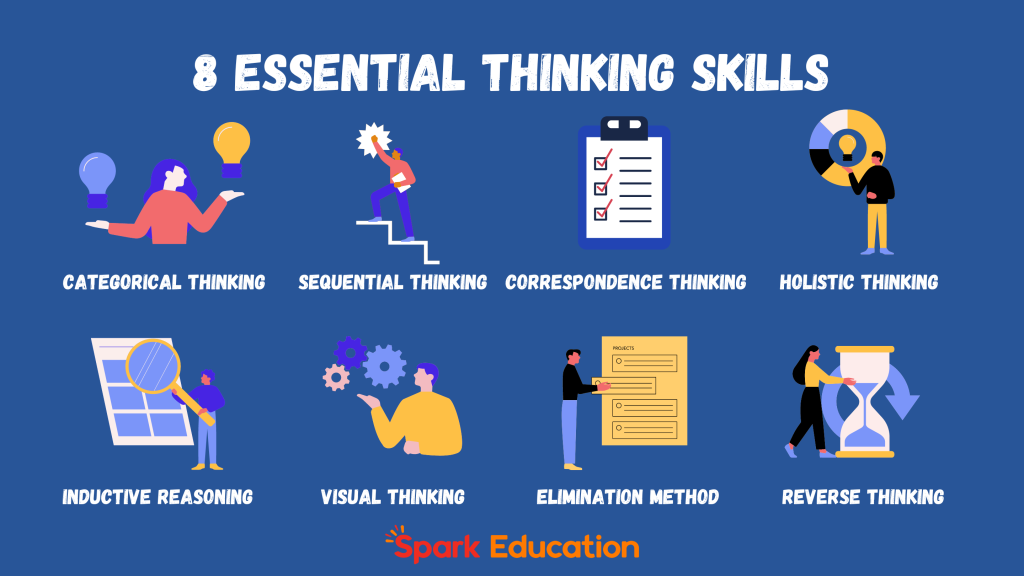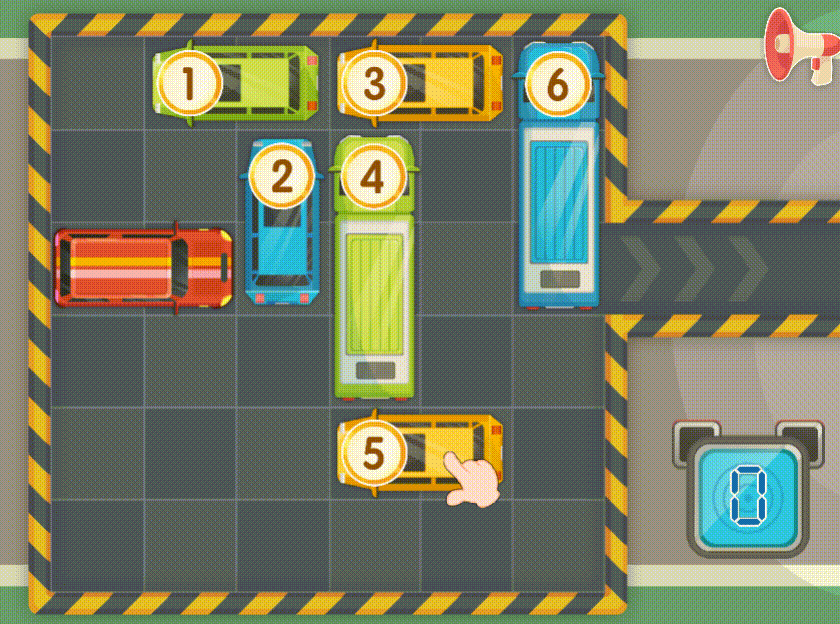Do you often feel that your child struggles with understanding math? When the type of problem or knowledge changes, your child doesn’t know how to adapt or solve it. These are signs of a lack of thinking skills. What essential thinking skills should elementary school students have? This blog lists eight critical thinking skills that, once mastered, will make learning both easy and enjoyable for your child.

The 8 Essential Thinking Skills Every Child Needs
1. Categorical Thinking
Categorical thinking helps children organize information and understand relationships between different concepts. This skill enables them to classify objects, ideas, and data based on common characteristics, which is essential for solving math problems and understanding patterns. For example, when children learn to group shapes by their properties, they develop a deeper understanding of geometry and spatial relationships.
2. Sequential Thinking
Sequential thinking is crucial for following steps in problem-solving and understanding the order of operations in math. This skill allows children to recognize and predict sequences, which is important for tasks such as performing multi-step calculations and understanding algorithms. By mastering sequential thinking, students can break down complex problems into manageable steps, making it easier to find solutions and improve their overall math performance.
3. Correspondence Thinking
Correspondence thinking develops the ability to match one-to-one relationships, which is crucial for early math skills like counting and number sense. This skill helps children understand the concept of equivalence and pairing, such as matching a number of objects to the corresponding numeral. By strengthening correspondence thinking, students can better grasp fundamental mathematical concepts and build a strong foundation for more advanced topics.
4. Holistic Thinking
Holistic thinking encourages seeing the big picture, aiding in comprehension and the ability to tackle complex problems. This skill helps children understand how individual elements fit into a larger system, which is important for subjects like geometry, where understanding the whole shape is as crucial as recognizing its parts. Holistic thinking also promotes creativity and innovation by enabling students to connect different ideas and concepts.
5. Inductive Reasoning
Inductive reasoning enables drawing general conclusions from specific examples, fostering analytical and critical thinking. This skill is essential for problem-solving and hypothesis testing, where students must observe patterns and make predictions based on their observations. By developing inductive reasoning, children can enhance their ability to think logically and make informed decisions based on evidence and reasoning.
6. Visual Thinking
Visual thinking enhances spatial awareness and the ability to visualize mathematical concepts. This skill is vital for understanding geometry, graphs, and other visual representations of data. By improving visual thinking, students can better interpret and analyze visual information, which is crucial for solving a wide range of math problems. Visual thinking also supports creativity and innovation by helping students imagine and manipulate objects in their minds.
7. Elimination Method
The elimination method fosters logical reasoning by ruling out incorrect options to find the correct answer. This skill is essential for multiple-choice questions and problem-solving tasks where identifying the best solution involves systematically eliminating alternatives. By mastering the elimination method, students can improve their decision-making skills and increase their accuracy in solving math problems.
8. Reverse Thinking
Reverse thinking promotes flexibility in thinking and the ability to approach problems from different angles. This skill encourages students to think backward from the desired outcome to the starting point, which is useful for solving complex problems and verifying solutions. By developing reverse thinking, children can enhance their problem-solving abilities and become more adept at finding creative and efficient solutions to challenging tasks.
How Spark Math Develops These Thinking Skills
At Spark Math by Spark Education, we have designed our courses to gradually build these eight essential thinking skills through a well-structured curriculum and comprehensive support system:

Progressive Skill Development
Our courses are tailored to develop these skills from basic to advanced levels, ensuring a solid foundation. Each lesson is carefully crafted to introduce and reinforce specific thinking skills, helping students build their cognitive abilities step by step.
Detailed Syllabus and Support
We provide a detailed weekly plan focusing on specific thinking skills, helping students systematically build their knowledge and abilities. Our Spark Math syllabus is designed to cover a wide range of topics and activities that challenge and engage students, promoting continuous growth and development.
Heuristic Teaching Methods
Our Spark Math teachers guide children to think critically, focusing on the learning process to help them understand not just the “what” but also the “why” behind concepts. This approach fosters deep comprehension and encourages students to become independent learners.
Other Features
- Engaging Animated Lessons: Our fun and interactive animations spark students’ interest in learning. By presenting complex concepts through visually appealing and easy-to-understand animations, we make math enjoyable and accessible for young learners.
- Interactive Game-Based Learning: We incorporate games to make learning enjoyable and encourage a love for math. Our game-based activities are designed to reinforce key concepts and skills, making practice both effective and fun.
- Post-Class Exercises and Feedback: Regular exercises reinforce learning, and our teachers provide periodic evaluations and communicate progress with parents. These exercises are tailored to each student’s needs, ensuring they receive targeted practice that addresses their specific areas for improvement. Our teachers also offer personalized feedback and support, helping students stay on track and achieve their learning goals.

These eight thinking skills are crucial for improving your child’s math performance and enhancing their critical thinking abilities. As these skills gradually develop, you will notice that your child becomes more independent, their judgment improves, and they start to ask questions, analyze, and solve problems on their own, becoming independent thinkers and self-directed learners. Spark Math’s courses are designed to effectively help students enhance these essential thinking skills. If you’re interested, try out our FREE trial class today!




